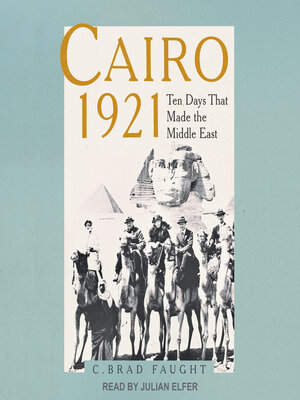
Sign up to save your library
With an OverDrive account, you can save your favorite libraries for at-a-glance information about availability. Find out more about OverDrive accounts.
Find this title in Libby, the library reading app by OverDrive.



Search for a digital library with this title
Title found at these libraries:
| Library Name | Distance |
|---|---|
| Loading... |
The first comprehensive history of the 1921 Cairo Conference which reveals its enduring impact on the modern Middle East
Called by Winston Churchill in 1921, the Cairo Conference set out to redraw the map of the Middle East in the wake of the First World War and the collapse of the Ottoman Empire. The summit established the states of Iraq and Jordan as part of the Sherifian Solution and confirmed the establishment of a Jewish homeland in Palestine—the future state of Israel. No other conference had such an enduring impact on the region.
C. Brad Faught demonstrates how the conference, although dominated by the British with limited local participation, was an ambitious, if ultimately unsuccessful, attempt to move the Middle East into the world of modern nationalism. Faught reveals that many officials, including T. E. Lawrence and Gertrude Bell, were driven by the determination for state building in the area to succeed. Their prejudices, combined with their abilities, would profoundly alter the Middle East for decades to come.
Called by Winston Churchill in 1921, the Cairo Conference set out to redraw the map of the Middle East in the wake of the First World War and the collapse of the Ottoman Empire. The summit established the states of Iraq and Jordan as part of the Sherifian Solution and confirmed the establishment of a Jewish homeland in Palestine—the future state of Israel. No other conference had such an enduring impact on the region.
C. Brad Faught demonstrates how the conference, although dominated by the British with limited local participation, was an ambitious, if ultimately unsuccessful, attempt to move the Middle East into the world of modern nationalism. Faught reveals that many officials, including T. E. Lawrence and Gertrude Bell, were driven by the determination for state building in the area to succeed. Their prejudices, combined with their abilities, would profoundly alter the Middle East for decades to come.






